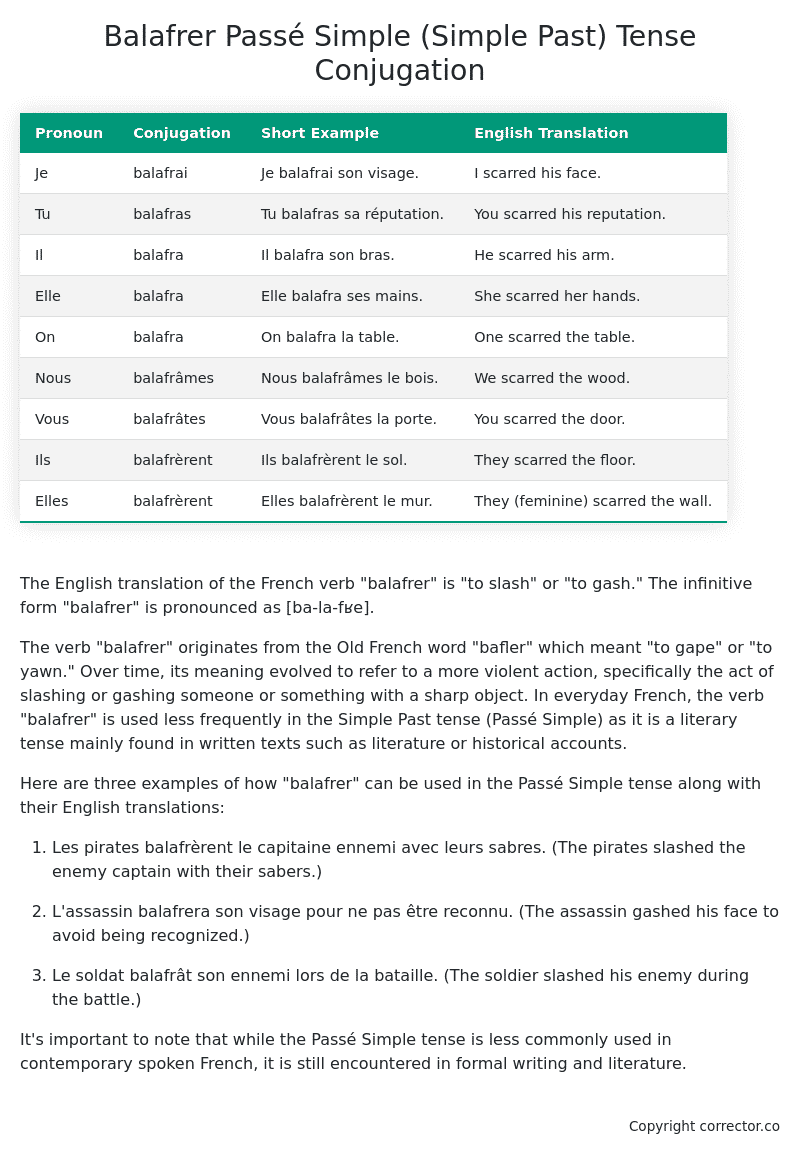Passé Simple (Simple Past) Tense Conjugation of the French Verb balafrer
Introduction to the verb balafrer
The English translation of the French verb “balafrer” is “to slash” or “to gash.” The infinitive form “balafrer” is pronounced as [ba-la-fʁe].
The verb “balafrer” originates from the Old French word “bafler” which meant “to gape” or “to yawn.” Over time, its meaning evolved to refer to a more violent action, specifically the act of slashing or gashing someone or something with a sharp object. In everyday French, the verb “balafrer” is used less frequently in the Simple Past tense (Passé Simple) as it is a literary tense mainly found in written texts such as literature or historical accounts.
Here are three examples of how “balafrer” can be used in the Passé Simple tense along with their English translations:
-
Les pirates balafrèrent le capitaine ennemi avec leurs sabres.
(The pirates slashed the enemy captain with their sabers.) -
L’assassin balafrera son visage pour ne pas être reconnu.
(The assassin gashed his face to avoid being recognized.) -
Le soldat balafrât son ennemi lors de la bataille.
(The soldier slashed his enemy during the battle.)
It’s important to note that while the Passé Simple tense is less commonly used in contemporary spoken French, it is still encountered in formal writing and literature.
Table of the Passé Simple (Simple Past) Tense Conjugation of balafrer
| Pronoun | Conjugation | Short Example | English Translation |
|---|---|---|---|
| Je | balafrai | Je balafrai son visage. | I scarred his face. |
| Tu | balafras | Tu balafras sa réputation. | You scarred his reputation. |
| Il | balafra | Il balafra son bras. | He scarred his arm. |
| Elle | balafra | Elle balafra ses mains. | She scarred her hands. |
| On | balafra | On balafra la table. | One scarred the table. |
| Nous | balafrâmes | Nous balafrâmes le bois. | We scarred the wood. |
| Vous | balafrâtes | Vous balafrâtes la porte. | You scarred the door. |
| Ils | balafrèrent | Ils balafrèrent le sol. | They scarred the floor. |
| Elles | balafrèrent | Elles balafrèrent le mur. | They (feminine) scarred the wall. |
Other Conjugations for Balafrer.
Le Present (Present Tense) Conjugation of the French Verb balafrer
Imparfait (Imperfect) Tense Conjugation of the French Verb balafrer
Passé Simple (Simple Past) Tense Conjugation of the French Verb balafrer (You’re reading it right now!)
Passé Composé (Present Perfect) Tense Conjugation of the French Verb balafrer
Futur Simple (Simple Future) Tense Conjugation of the French Verb balafrer
Futur Proche (Near Future) Tense Conjugation of the French Verb balafrer
Plus-que-parfait (Pluperfect) Tense Conjugation of the French Verb balafrer
Passé Antérieur (Past Anterior) Tense Conjugation of the French Verb balafrer
Futur Antérieur (Future Anterior) Tense Conjugation of the French Verb balafrer
Subjonctif Présent (Subjunctive Present) Tense Conjugation of the French Verb balafrer
Subjonctif Passé (Subjunctive Past) Tense Conjugation of the French Verb balafrer
Subjonctif Imparfait (Subjunctive Imperfect) Tense Conjugation of the French Verb balafrer
Subjonctif Plus-que-parfait (Subjunctive Pluperfect) Tense Conjugation of the French Verb balafrer
Conditionnel Présent (Conditional Present) Tense Conjugation of the French Verb balafrer
Conditionnel Passé (Conditional Past) Tense Conjugation of the French Verb balafrer
Conditionnel Passé II (Conditional Past II) Tense Conjugation of the French Verb balafrer
L’impératif Présent (Imperative Present) Tense Conjugation of the French Verb balafrer
L’impératif Passé (Imperative Past) Tense Conjugation of the French Verb balafrer
L’infinitif Présent (Infinitive Present) Tense Conjugation of the French Verb balafrer
L’infinitif Passé (Infinitive Past) Tense Conjugation of the French Verb balafrer
Le Participe Présent (Present Participle) Tense Conjugation of the French Verb balafrer
Le Participe Passé (Past Participle) Tense Conjugation of the French Verb balafrer
Struggling with French verbs or the language in general? Why not use our free French Grammar Checker – no registration required!
Get a FREE Download Study Sheet of this Conjugation 🔥
Simply right click the image below, click “save image” and get your free reference for the balafrer Passé Simple tense conjugation!

Balafrer – About the French Passé Simple (Simple Past) Tense
Formation
Usage
Narration
Historical Context
Interactions with other tenses
Passé Composé
Imparfait
Conditional and Subjunctive
Summary
I hope you enjoyed this article on the verb balafrer. Still in a learning mood? Check out another TOTALLY random French verb conjugation!


